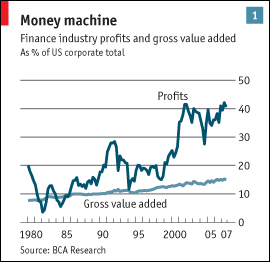Harry Moroz
Corporate Government Reform
 In some ways, House passage of a bill taxing 90% of TARP firm employees’ bonuses defies logic. Until just recently, quibbling lawmakers couldn’t figure out a way to remove earmarked pet projects from a $410 billion bill funding the government, even though they all oppose the projects. The earmarks made up a whopping 1.9% of the total cost of the legislation, while the bonuses AIG paid to employees of its Financial Products division are a trifling 0.09% of total government aid authorized for the insurance giant. Why would anyone care about such a pittance? Further, Congress and the administration, of course, knew about the bonuses all along – two full pages are devoted to AIG bonuses and executive compensation alone in the February 6 TARP Special Inspector General report to Congress – but were only whipped into action by (we’re told) frothing, perhaps murderous, populists.
In some ways, House passage of a bill taxing 90% of TARP firm employees’ bonuses defies logic. Until just recently, quibbling lawmakers couldn’t figure out a way to remove earmarked pet projects from a $410 billion bill funding the government, even though they all oppose the projects. The earmarks made up a whopping 1.9% of the total cost of the legislation, while the bonuses AIG paid to employees of its Financial Products division are a trifling 0.09% of total government aid authorized for the insurance giant. Why would anyone care about such a pittance? Further, Congress and the administration, of course, knew about the bonuses all along – two full pages are devoted to AIG bonuses and executive compensation alone in the February 6 TARP Special Inspector General report to Congress – but were only whipped into action by (we’re told) frothing, perhaps murderous, populists.
Debate about the House tax bill and about earmarks – really, the impassioned furor created by each – is a striking reminder to us that governance in this country is at risk of going off track. Competing power centers in Congress –like the Blue Dog Democrats, the New Democrats, and the Triumvirate of Centrists (Collins, Snowe, and Specter) – have shifted policymaking strategy away from careful consideration of what government can do for us and towards some mushy philosophy of an ideal state that government should seek (balanced budgets or “consensus”) that, in times of crisis, forces reactive and even reactionary legislation. The tax on AIG bonuses was necessary, but other than selective imprisonment (!), post hoc, selective taxation is a pretty good demonstration of the coercive power governments can at times exercise.
Government doesn’t have to work this way. Hendrik Hertzberg recently described a program of governance designed to “nudge investment from resource-intensive enterprises toward labor-intensive ones.” In other words, legislation to create jobs. And Jeffrey Sachs has been pushing the concept of a “medium-term fiscal framework” to provide guidelines for action on taxes and investment down the road. He reminds us that:
The choice of spending versus taxes should turn first and foremost on the purposes of government, or on what economists quaintly call “the allocation of resources.” It’s silly to debate whether investing in a $100 million bridge creates more jobs than a $100 million tax cut if we really need the bridge!
As The Economist noted in an important article a year ago yesterday, “Modern finance has promised miracles, seduced the brilliant and the greedy – and wrought destruction.” Modern finance is still seducing our policymakers and this tremendous profit center will continue to do so unless we demand our policymakers not only to think longer term – which they most certainly do – but to act for the longer term as well. Narrowly focusing on balanced budgets – and only reacting when (justified) taxpayer anger emerges – are a narrow-minded way of governing for the long-term.
Harry Moroz: Author Bio | Other Posts
Posted at 2:20 PM, Mar 20, 2009 in
Tax Policy
Permalink | Email to Friend










